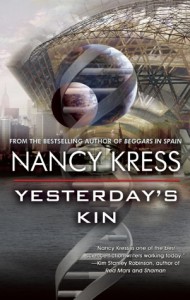

Yesterday’s Kin
Nancy Kress
The aliens arrived four months ago. They touched down next to NYC and immediately shielded the ship with an opaque wall of energy. No one has seen them. No one has conversed with them. All they will say, over and over, is that they are here
“To make contact with humanity. A peace mission.”
Despite the innocuous reassurances, they’ve been rather shy about actually making said contact--at least, until now, when an obscure paper in genetics finally breaks the loop. Marianne was thrilled enough to have her paper on evolutionary genetics accepted into Nature, but she cannot even begin to imagine the ramifications of her work or the bombshell that the aliens are about to drop on Earth.
One of the aspects that I really enjoyed in Yesterday’s Kin is the science. The plot involves everything from panspermia to the mitochondrial Eve to the bottleneck event theory. The story itself centres around Marianne and her children, the belligerent Elizabeth, the passionate Ryan, and the hapless Noah. Yet although the story is about families, I felt distanced from all of the characters, unable to connect or empathise with any of them. This strange sense of isolation is oddly fitting: in some ways, the characters are cut adrift from one another, trapped in mutual incomprehension of each others’ minds and hearts. Marianne’s emotional and mental distance from her children, her closest family, serves to reinforce and intensify the book’s overall theme of biological kinship. As Marianne thinks,
“Yes, she had seen her grandchild. But whatever comfort or connection that had been supposed to bring her, it hadn’t. It seemed to her, perhaps irrationally, that never had she felt so alone.”
As always seems to be the case with alien stories, much of the plot focuses on determining which side of the trope these particular aliens fall on. While the overall story is promising, I think this would have worked better as a short story rather than a novel. For me at least, it felt as though much of the book’s volume was taken up with rambling or repetitious scenes, and while these may have served to increase the tension, I found them rather tedious. While the ending is interesting, it is eminently guessable from about halfway through. Perhaps my disconnect from the characters warped my viewpoint, but I felt that given the rather limited worldbuilding, the story was too drawn out for the meagre payoff.
(show spoiler)
At the same time, the book is a fast and enjoyable read. I loved the way that Kress intertwined the themes of alien-human ties with family ones. Some of the characters' thoughts about relationships were especially poignant; for example:
“When your children were small you worried that they would die and you would lose them, and then they grew up and you ended up losing the children they’d been, anyway.”
“He had always been selfish. He’d known that about himself. Only before now, he’d called it ‘independent.’”
Overall, while I think the story could have benefited from a certain amount of judicious cutting, I still found it an enjoyable read, and would recommend it for fans of slow-building plots and scientifically-detailed alien tales.
~~I received this ebook through NetGalley from the publisher, Tachyon Publications, in exchange for my honest review. ~~

 10
10




